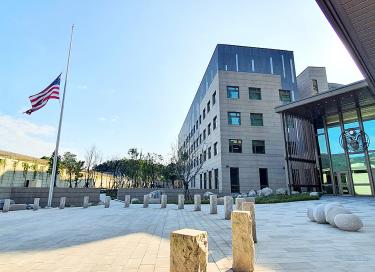US Chairman of the Joint Chiefs of Staff General Mark Milley yesterday extended his condolences over the deaths of Chief of the General Staff General Shen Yi-ming (沈一鳴) and seven other military officials who were killed in a helicopter crash on Thursday.
“On behalf of the men and women of the United States Military, I want to send our condolences to members of the Taiwan military on the tragic loss of General Shen and the seven other victims in a helicopter accident,” Milley, the highest-ranking officer in the US Army, said in a statement on Facebook. “General Shen will be remembered as an exceptional leader to his people, and a champion for Taiwan’s defense and regional security. We are grateful for the service he rendered so selflessly, and cherish our friendship and strong defense relations with Taiwan.”
The American Institute in Taiwan (AIT) yesterday flew the US national flag at half-mast at its compound in Taipei’s Neihu District (內湖).
“AIT stands ready to assist our Taiwan counterparts in the aftermath of this tragedy,” it said in a statement on Thursday.
It posted an undated photograph on Facebook yesterday of AIT Director Brent Christensen and Shen making a toast.
A number of local politicians — including President Tsai Ing-wen (蔡英文), former president Ma Ying-jeou (馬英九), Premier Su Tseng-chang (蘇貞昌), Minister of Foreign Affairs Joseph Wu (吳釗燮), Minister of Justice Tsai Ching-hsiang (蔡清祥), People First Party Chairman James Soong (宋楚瑜) and Chinese Nationalist Party (KMT) Vice Chairman Hau Lung-bin (郝龍斌) — yesterday visited a mourning hall set up at Tri-Service General Hospital in Neihu to pay tribute to the late military officials.
Former minister of national defense Kao Hua-chu (高華柱) also paid tribute at the mourning hall.
Kao was involved in the crash of a UH-1H aircraft during a military drill in October 1974. That crash killed 13 military officers and paralyzed then-army commander in chief Yu Hao-chang (于豪章), under whom Kao served as an aide.
Meanwhile, China’s state-run Web site Huanqiu.com on Thursday posted a commentary on the crash by a netizen titled Buyidao (補壹刀), or “one more thrust of the knife.”
“Once China decides to use force to liberate Taiwan, do you think these Black Hawk helicopters can shield Taiwan from the Chinese armed forces?” Buyidao wrote, asking how Taiwan would dare fight China with such poor military strength, even though it has spent a lot of money buying weapons from the US.
Comments from the Chinese Communist Party about Taiwanese affairs are not welcome, Taiwanese netizens wrote in response.
Additional reporting by Huang Hsin-po and Chung Li-hua
Source: Taipei Times - 2020/01/04





















